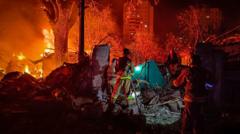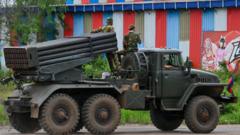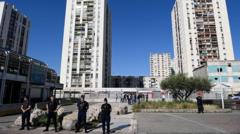In a devastating incident, three Colombian soldiers were killed and four others injured during a drone attack attributed to dissident rebel factions in the country's southwest. The attack occurred at a security checkpoint on the Naya River, an area notorious for drug trafficking activities. This escalation in violence underscores a rising trend of drone warfare among illegal armed groups in Colombia, prompting government action to enhance anti-drone technology. The military identified the assailants as operatives under the command of a dissident rebel leader known as Iván Mordisco, who has rejected peace negotiations with the government and is linked to various criminal enterprises in the region, including cocaine trade and extortion.
Three Colombian Soldiers Killed in Drone Attack by Dissident Rebels

Three Colombian Soldiers Killed in Drone Attack by Dissident Rebels
Explosives dropped from drones targeted soldiers at a checkpoint in southwestern Colombia, sparking outrage and calls for improved security measures.
The Colombian Army has paid tribute to the fallen soldiers—Wilmar Rivas, Andrés Estrada, and Dario Estrada—while officials emphasize the urgent need to address the increasing threat posed by unmanned aerial vehicles in conflict zones.
The region near Buenaventura has seen a surge in violence as rebel factions continue to exploit lucrative drug routes. In 2024 alone, Colombia recorded 115 drone attacks, raising alarms over national security and the effectiveness of existing countermeasures to protect military personnel from such advanced forms of assault. The government has pledged to improve deterrents and response strategies against these aerial threats as it seeks to strengthen security for its forces amid the growing complexity of violence in the era of drone warfare.
The region near Buenaventura has seen a surge in violence as rebel factions continue to exploit lucrative drug routes. In 2024 alone, Colombia recorded 115 drone attacks, raising alarms over national security and the effectiveness of existing countermeasures to protect military personnel from such advanced forms of assault. The government has pledged to improve deterrents and response strategies against these aerial threats as it seeks to strengthen security for its forces amid the growing complexity of violence in the era of drone warfare.
















